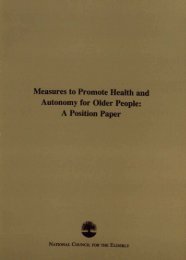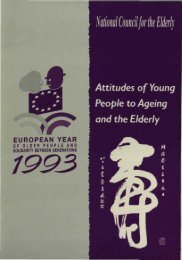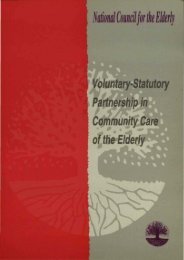From Ageism to Age Equality: Addressing the Challenges ...
From Ageism to Age Equality: Addressing the Challenges ...
From Ageism to Age Equality: Addressing the Challenges ...
You also want an ePaper? Increase the reach of your titles
YUMPU automatically turns print PDFs into web optimized ePapers that Google loves.
Marginalisation is very often <strong>the</strong> result of such discrimination, as is <strong>the</strong> case with <strong>the</strong> forcedretirement from work of people over <strong>the</strong> age of 65 (Palmore, 1999; Laslett, 1991). Forcing people <strong>to</strong>leave <strong>the</strong> workforce at a certain age, which in effect endorses <strong>the</strong> exclusion of a group from <strong>the</strong>workforce and from earning money, can debase ‘<strong>the</strong>ir status in <strong>the</strong> eyes of <strong>the</strong>ir juniors, and aboveall has devalued <strong>the</strong>m in <strong>the</strong>ir own estimation of <strong>the</strong>mselves’ (Laslett, 1991). An important point <strong>to</strong>consider is ‘those that write off <strong>the</strong> elderly are also writing off <strong>the</strong>mselves’.Under-representation of older people at local and global levels and lack of positive steps <strong>to</strong> enableolder people <strong>to</strong> participate fully in social, economic and political activities also results inmarginalisation.Older People’s Experiences of <strong><strong>Age</strong>ism</strong>Research shows that many older people have experienced an ageist event (Palmore, 2001). The mostfrequent was, ‘I was <strong>to</strong>ld a joke that pokes fun at older people’. O<strong>the</strong>rs said <strong>the</strong>y ‘were called aninsulting name’ or ‘were treated with less dignity and respect’. Some said that people ‘assumed I couldnot hear well because of my age’. While older people may be aware of being seen as ‘old’, <strong>the</strong>y may beuncertain about making claims that <strong>the</strong>y are actively discriminated against because of <strong>the</strong>ir age. Oneexplanation for this is that age discrimination can be obscure, subtle and may be difficult <strong>to</strong> decipher.Older People’s Perspectives on <strong><strong>Age</strong>ism</strong>14Ano<strong>the</strong>r impact of negative stereotypes and ageist language is that people deny that <strong>the</strong>y areageing, internalise this denial and hence reproduce ageism. Older people dissociate <strong>the</strong>mselves from<strong>the</strong> wider group of old people because <strong>the</strong>y do not see <strong>the</strong>mselves as old.Ways <strong>to</strong> Promote Positive <strong>Age</strong>ingThe concept of ‘positive ageing’ can be promoted by:recognising and challenging ageist stereotypesnot ignoring older peoplemaking sure organisations address <strong>the</strong> needs of people of all agesinviting local retirement groups <strong>to</strong> present workshops on age awarenessinforming agencies involved with older people of job opportunitiesmaking events and publications accessible <strong>to</strong> older peopleincluding pictures of older people in publicationstalking <strong>to</strong> people of all ages about how ageism affects <strong>the</strong>m.Conference Proceedings















